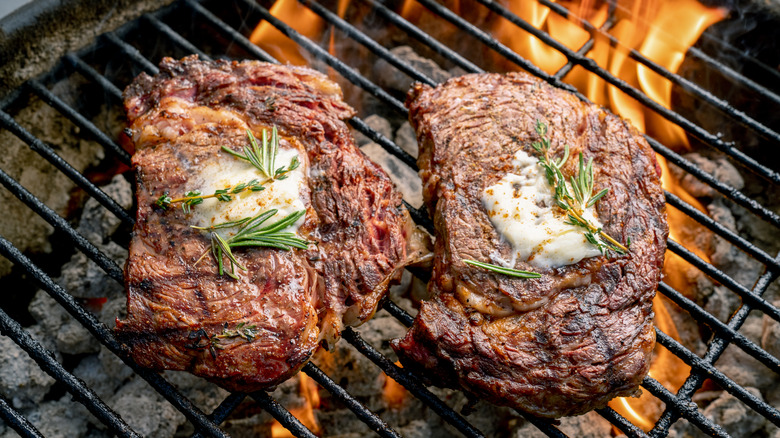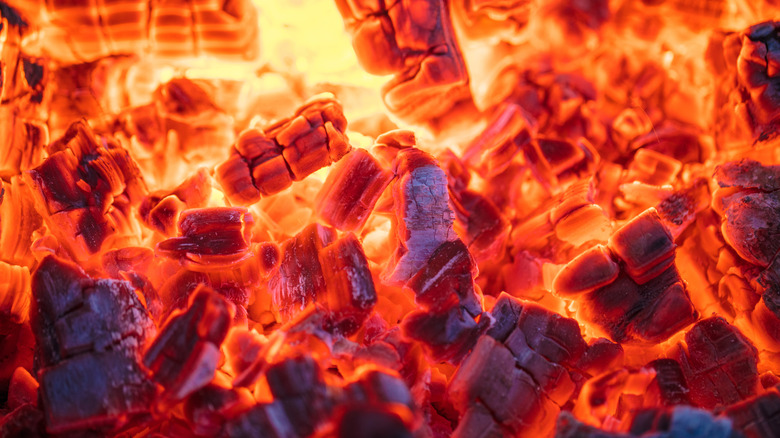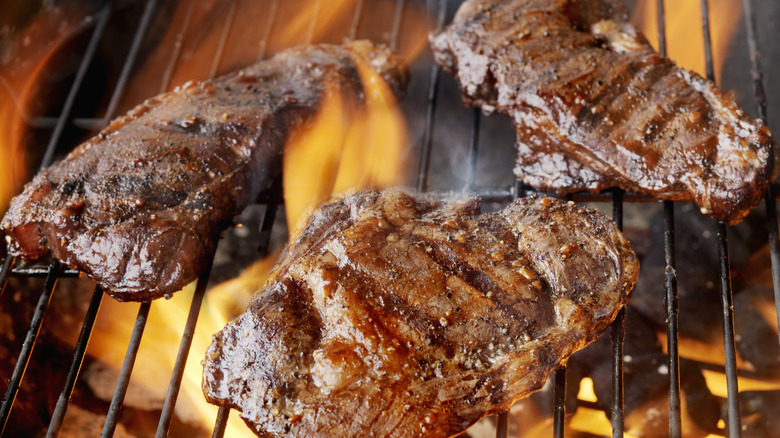Why A Charcoal Grill May Be Your Best Bet For Steak
It's an argument almost as old as grilling itself. What is the best way to cook your meat? Should you use propane? An electric grill? Natural gas? Or is it good old fashioned charcoal that's best? The truth is that a lot depends on the kind of meat you're using, the flavor you're going for, and a variety of other factors. But if you're looking to perfectly grill steak, you may be better off going with charcoal.
Each method of grilling has its advantages and disadvantages, and some of the characteristics of charcoal make it ideal for cooking an amazing steak. For one thing, charcoal is better at adding smokiness to meat than any gas or electric grilling options.
Though it can take a while longer to heat up than gas and electric heat sources, charcoal grills also get a lot hotter than the competition. By some measures, by as much as 200 degrees Fahrenheit. This has the effect of creating a fantastic sear, an important part of a well-cooked steak. Though there are propane grills that can reach a similar temperatures, they tend to be quite expensive. So if you're specifically looking to make a porterhouse, or for the best way to cook a New York strip on the grill, stick with charcoal.
Can you cook your steak directly on the coals?
In fact, there are some backyard chefs out there with so much love for a charcoal-cooked steak that they take it one step further. While most of the time, charcoal grilling means igniting coals at the bottom of the grill and placing your meat on the grates above, there are those who claim the best steaks are made by taking a far more direct route: searing the meat straight on the coals.
Proponents of this technique include James Beard Award-winning chef Tim Byres, who told The New York Times that he took inspiration from former American president Dwight D. Eisenhower, who would stun guests by nonchalantly dropping massive steaks onto the embers. To that end, Byres seems to also believe bigger is better. So if you see any five-pound, two-foot-long bone-in rib-eyes at the butcher, now you know how to handle them.
However, there are a few stipulations that come with cooking your steak directly on the hot coals. For one, it is better to use natural lump charcoal rather than the familiar charcoal briquettes in their large paper bags. The latter normally come with lighter fluid and other chemicals added. While not necessarily a problem when you're grilling a few inches above, these chemicals can leach directly into the steak and ruin its flavor. Needless to say, for similar reasons, you shouldn't use any lighter fluid on your charcoal for this method.
The advantages of cooking with natural charcoal
Evidently, cooking a steak directly on natural lump charcoal — if done correctly — doesn't just result in a fantastic sear and plenty of welcome char, it also infuses the meat with even more of that desired smoky flavor. Though the intense temperature and crackling fires of charcoal grilling can be tricky to control, reducing open air between the steak and the heat lessens that risk, and minimizes the potential for flare-ups.
But even if you're not quite up for grilling your steak in this rustic style, it's still possible to use natural lump charcoal in your charcoal grill. On top of the benefit of cooking with fewer added chemicals, it also burns hotter than the briquettes, leaves less ash afterward, and can be easier to light, therefore negating the need for lighter fluid in the first place. Some also say that the temperature is more manageable with natural charcoal than with the briquettes.
Something to keep in mind with natural charcoal is that because it is, well, natural, its lumps are almost always in an endless variety of shapes and sizes, which can create uneven heat as smaller lumps burn out before larger ones. This can be hedged by breaking all the chunks into smaller pieces of similar size before grilling.


